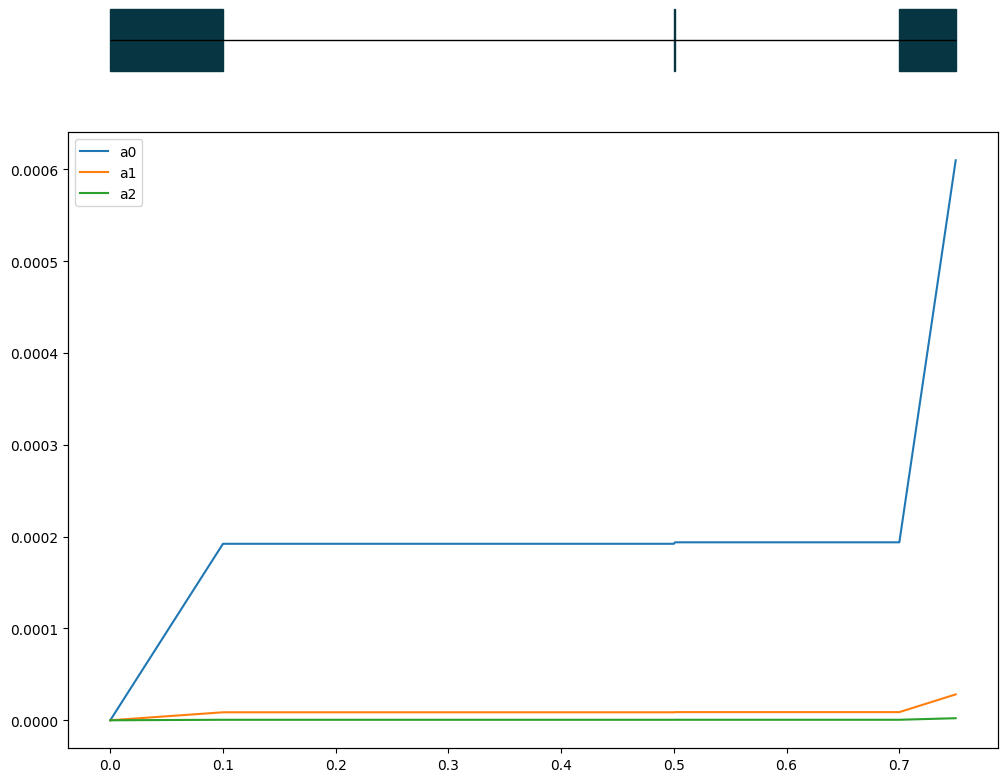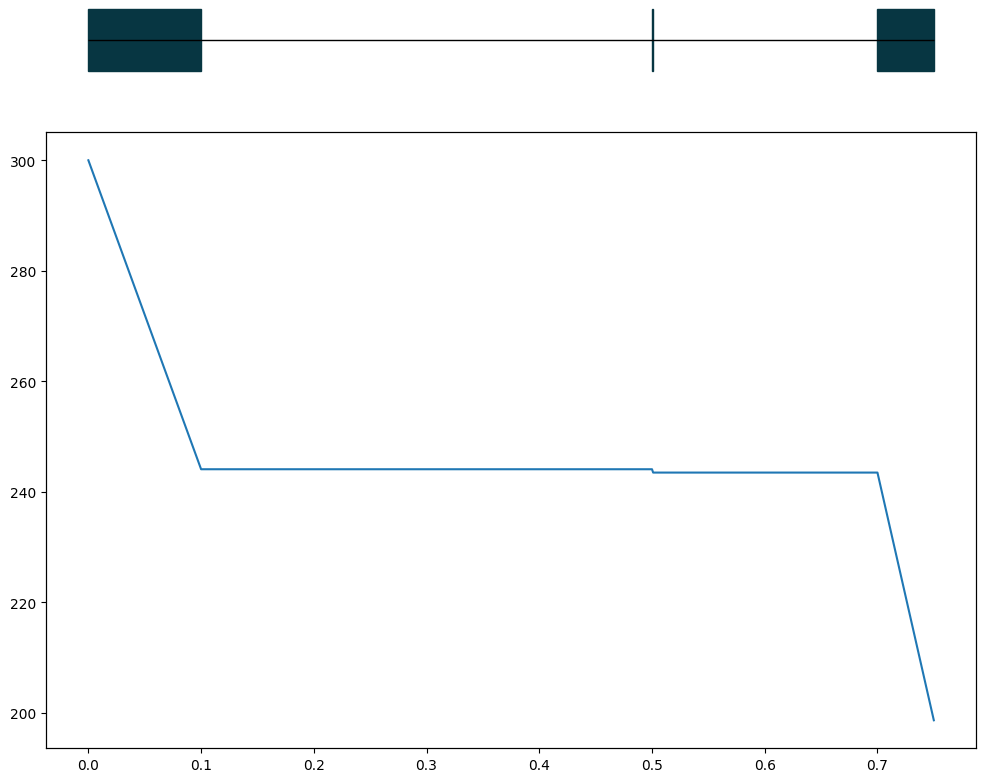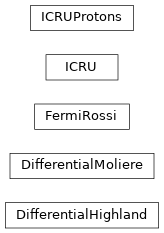Fermi#
Fermi-Eyges#
The Fermi-Eyges module is a reimplementation of the Fermi-Eyges transport framework, largely based on the work and publications of Bernard Gottschalk. See [1] for the complete validation of this implementation.
- The module is composed of:
Materials database (materials_db.py): reads, loads and provides an interface to data (stopping power, radiation lengths, etc.) for a large set of materials commonly used in protontherapy. The database reads stopping power and range tables from the p-star database format or from SRIM software.
Stopping power (stopping.py): computes the various range-energy direct and inverse relationships from measured range stopping power data tables;
MCS (multiple Coulomb scattering) (mcs.py): implements various scattering angle models (Gottschalk’s DifferentialMoliere being the default);
Fermi-Eyges (fermi_eyges.py): computes the transport integrales (A0, A1, A2 and B) for a given material, thickness and incident energy. It also returns the residual energy to allow easy chaining through multiple slabs;
Propagation (propagation.py): propagation of a beam through a mutli-material beamline following the Fermi-Eyges transport theory.
Plotting support is also provided in the georges/vis module for the visualization of scattering beamlines.
Material database#
Material |
Range Table |
Density (g/cm3) |
|---|---|---|
H2(gaseous) |
PSTAR |
0.0083748 |
Be |
PSTAR |
1.848 |
B4C |
SRIM |
2.52 |
Polyethylene (PE) |
PSTAR |
0.94 |
Polystyrene (PS) |
PSTAR |
1.06 |
C (graphite) |
PSTAR |
1.7 |
C (diamond) |
SRIM |
3.52 |
Polycarbonates (lexan) |
PSTAR |
1.2 |
PET (mylar) |
SRIM |
1.4 |
Air (gaseous) |
PSTAR |
1.205e-3 |
Water |
PSTAR |
1 |
O2 |
PSTAR |
0.00133151 |
Al |
PSTAR |
2.6989 |
Ti |
PSTAR |
4.54 |
Co |
PSTAR |
8.96 |
Sn |
PSTAR |
7.31 |
Ta |
SRIM |
16.66 |
Au |
PSTAR |
19.32 |
Pb |
PSTAR |
11.34 |
Usage#
Import the necessary submodules:
from georges.fermi import materials as gfmaterial
from georges import ureg as _ureg
Define some materials#
mat_water = gfmaterial.Water
mat_beryllium = gfmaterial.Beryllium
Get the required thickness to degrade from 230 MeV to 70 MeV#
thickness_be = mat_beryllium.required_thickness(70 * _ureg.MeV, 230 * _ureg.MeV)
thickness_water = mat_water.required_thickness(70 * _ureg.MeV, 230 * _ureg.MeV)
print(thickness_be, thickness_water)
19.169800112741544 centimeter 28.84123456218398 centimeter
Compute the residual kinematics after certain thickness of material#
kpos_be = mat_beryllium.stopping(thickness=10*_ureg.cm, kinetic_energy=230*_ureg.MeV)
kpos_water = mat_water.stopping(thickness=20*_ureg.cm, kinetic_energy=230*_ureg.MeV)
print(kpos_be, kpos_water)
Proton
(.etot) Total energy: 1099.5820959394134 megaelectronvolt
(.ekin) Kinetic energy: 161.31006593941365 megaelectronvolt
(.momentum) Momentum: 573.3466520615538 megaelectronvolt_per_c
(.brho): Magnetic rigidity: 1.9124787477682947 meter * tesla
(.range): Range in water (protons only): 17.899619025917477 centimeter
(.pv): Relativistic pv: 298.95574386317145 megaelectronvolt
(.beta): Relativistic beta: 0.5214223241528164
(.gamma): Relativistic gamma: 1.1719224923921197
Proton
(.etot) Total energy: 1072.1843760552133 megaelectronvolt
(.ekin) Kinetic energy: 133.91234605521342 megaelectronvolt
(.momentum) Momentum: 518.868898640674 megaelectronvolt_per_c
(.brho): Magnetic rigidity: 1.7307605058129751 meter * tesla
(.range): Range in water (protons only): 12.93917761761733 centimeter
(.pv): Relativistic pv: 251.09947504282806 megaelectronvolt
(.beta): Relativistic beta: 0.4839362615501817
(.gamma): Relativistic gamma: 1.142722304165044
Obtain the range at a given energy#
print(mat_water.range(230*_ureg.MeV))
print(mat_water.range(70*_ureg.MeV))
32.91623456218398 centimeter
4.075 centimeter
Obtain the kinematics required to reach a given range#
degraded_kinematics = mat_water.solve_range(15 * _ureg.cm)
print(degraded_kinematics)
Proton
(.etot) Total energy: 1084.0923017814318 megaelectronvolt
(.ekin) Kinetic energy: 145.82027178143207 megaelectronvolt
(.momentum) Momentum: 543.0485397286711 megaelectronvolt_per_c
(.brho): Magnetic rigidity: 1.8114151142303883 meter * tesla
(.range): Range in water (protons only): 15.0167665546081 centimeter
(.pv): Relativistic pv: 272.02639112633284 megaelectronvolt
(.beta): Relativistic beta: 0.5009246342182382
(.gamma): Relativistic gamma: 1.1554136403079522
Fermi-Eyges transport theory#
print(mat_water.scattering(230 * _ureg.MeV, 10*_ureg.cm))
print(mat_beryllium.scattering(100 * _ureg.MeV, 5*_ureg.cm))
{'A': [0.00032690981376365126, 1.474621884565932e-05, 9.271589147224058e-07], 'B': 9.254532829761458e-06, 'TWISS_ALPHA': -1.5934049958996594, 'TWISS_BETA': 0.10018430230651676, 'TWISS_GAMMA': 35.3242913259056}
{'A': [0.0026487738770234934, 2.8856630025506774e-05, 7.21573336792649e-07], 'B': 3.284173424811888e-05, 'TWISS_ALPHA': -0.8786573147293412, 'TWISS_BETA': 0.02197123121882577, 'TWISS_GAMMA': 80.6526798192824}
Tracking in a line#
Let’s define a line with several degraders and scatterers and we compute the parameters A_0, A_1 and A_2 along the line.
Download: click to download
%matplotlib inline
import georges
from georges.fermi import materials
from georges import ureg as _ureg
from georges.manzoni.elements import Degrader
sequence = georges.PlacementSequence(name="LINE")
d1 = georges.Element.Degrader(NAME="D1",
L=10*_ureg.cm,
MATERIAL=materials.Beryllium,
WITH_LOSSES=True)
d2 = georges.Element.Scatterer(NAME="D2",
L=0.1*_ureg.cm,
MATERIAL=materials.Graphite)
d3 = georges.Element.Degrader(NAME="D3",
L=5*_ureg.cm,
MATERIAL=materials.Aluminum,
WITH_LOSSES=True)
sequence.place(d1, at_entry=0*_ureg.m)
sequence.place(d2, at_entry=0.5*_ureg.m)
sequence.place(d3, at_entry=0.7*_ureg.m)
pbs = georges.fermi.propagate(
sequence=sequence,
energy=300 *_ureg.MeV,
beam={
'A0': 0,
'A1': 0,
'A2': 0,
})
s = []
a0 = []
a1 = []
a2 = []
for name, k in pbs.iterrows():
s.append(k['AT_ENTRY'].m_as('m'))
s.append(k['AT_EXIT'].m_as('m'))
a0.append(k['A0_IN'])
a0.append(k['A0_OUT'])
a1.append(k['A1_IN'])
a1.append(k['A1_OUT'])
a2.append(k['A2_IN'])
a2.append(k['A2_OUT'])
artist = georges.vis.ManzoniMatplotlibArtist()
artist.plot_cartouche(beamline=sequence.df)
artist.plot(s,a0,label='a0')
artist.plot(s,a1,label='a1')
artist.plot(s,a2,label='a2')
artist.ax.legend()
<matplotlib.legend.Legend at 0x7f04e9aed150>

We can also plot the energy degradation along the line:
s = []
edep = []
for name, k in pbs.iterrows():
s.append(k['AT_ENTRY'].m_as('m'))
s.append(k['AT_EXIT'].m_as('m'))
edep.append(k['ENERGY_IN'])
edep.append(k['ENERGY_OUT'])
artist = georges.vis.ManzoniMatplotlibArtist()
artist.plot_cartouche(beamline=sequence.df)
artist.plot(s,edep)

Python script#
If you would like to compute the coefficients for another material, you must adapt the file degrader_properties.gmad and run the script bdsim-input.gmad:
bdsim --file=bdsim-input.gmad --outfile=output.root --ngenerate=nparticles --batch
The program that computes the coefficients for losses and momentum deviation is compute_quantiles.py and it can be excecuted by:
python compute_coefficients.py path_results nparticles
Where path_to_results is the path to the bdsim output files and nparticles is the number of primary particles used in the simulation.
API#
|
|
|
|
|
|
|
|
|
|
|
|
